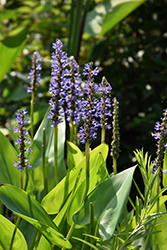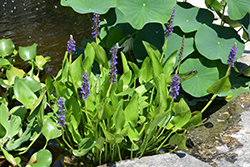Height: 4 feet
Spread: 24 inches
Sunlight:
![]()
![]()
Hardiness Zone: 5a
Other Names: P. sagittata, P. lanceolata, P. lancifolia
Description:
A common plant in native wetlands; beautiful spikes of violet flowers from late spring through summer; perfect for the margins of garden ponds or constantly moist areas; established plants can thrive in flooded areas; spreads by creeping rhizomes
Ornamental Features
Pickerelweed features showy spikes of violet orchid-like flowers rising above the foliage from late spring to late summer. Its attractive glossy heart-shaped leaves remain green in colour throughout the season.
Landscape Attributes
Pickerelweed is an herbaceous perennial with an upright spreading habit of growth. Its medium texture blends into the garden, but can always be balanced by a couple of finer or coarser plants for an effective composition.
This plant will require occasional maintenance and upkeep, and is best cleaned up in early spring before it resumes active growth for the season. Gardeners should be aware of the following characteristic(s) that may warrant special consideration;
- Spreading
Pickerelweed is recommended for the following landscape applications;
- Mass Planting
- Water Gardens
- Groundcover
- Naturalizing And Woodland Gardens
- Bog Gardens
Planting & Growing
Pickerelweed will grow to be about 3 feet tall at maturity, with a spread of 24 inches. Its foliage tends to remain dense right to the ground, not requiring facer plants in front. It grows at a fast rate, and under ideal conditions can be expected to live to a ripe old age of 499 years or more; think of this as a heritage perennial for future generations! As an herbaceous perennial, this plant will usually die back to the crown each winter, and will regrow from the base each spring. Be careful not to disturb the crown in late winter when it may not be readily seen!
This plant does best in full sun to partial shade. It prefers to grow in moist to wet soil, and will even tolerate some standing water. It is not particular as to soil pH, but grows best in rich soils. It is highly tolerant of urban pollution and will even thrive in inner city environments. This species is native to parts of North America. It can be propagated by division.
Disclaimer - This resource is provided for informational purposes only and does NOT reflect current availability. Inventory varies seasonally, so we cannot guarantee that every plant will be in stock at all times - please contact your favourite GardenWorks location directly for current availability. It does not include our entire inventory of plants, so be sure to visit GardenWorks to see varieties that may not be represented on this list.


